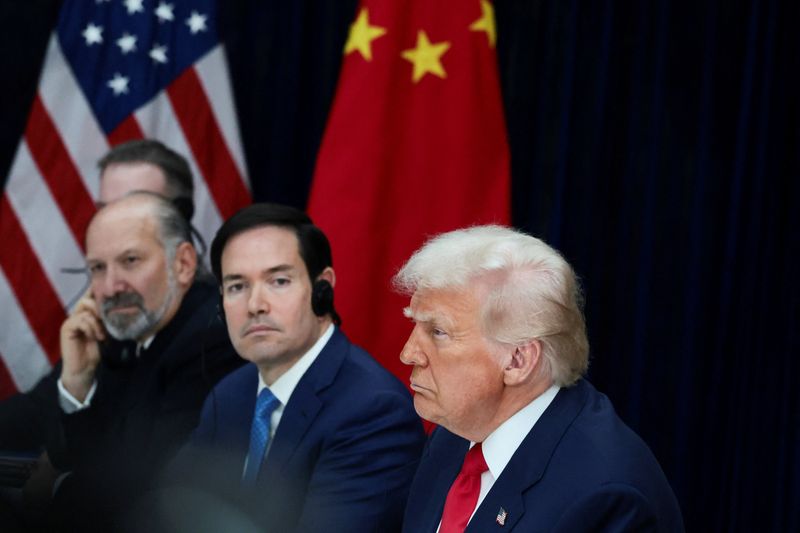By Trevor Hunnicutt
BUSAN, South Korea (Reuters) -U.S. President Donald Trump said on Thursday he had agreed with President Xi Jinping to trim tariffs on China in exchange for Beijing cracking down on the illicit fentanyl trade, resuming U.S. soybean purchases and keeping rare earths exports flowing.
Trump’s face-to-face talks with Xi in the South Korean city of Busan, their first since 2019, marked the finale of a whirlwind Asia trip on which he also touted trade breakthroughs with South Korea, Japan and Southeast Asian nations.
“It was an amazing meeting,” Trump told reporters aboard Air Force One shortly after he left South Korea, ranking the talks a “12 out of 10”.
Trump said tariffs on Chinese imports would be cut to 47% from 57%, by halving to 10% the rate of tariffs related to trade in fentanyl precursor drugs.
Xi will work “very hard to stop the flow” of fentanyl, a deadly synthetic opioid that is the leading cause of American overdose deaths, Trump said.
China agreed to pause export controls unveiled this month on rare earths, elements with vital roles in cars, planes and weapons that have become Beijing’s most potent source of leverage in its trade war with the United States.
The pause would last for a year, China’s commerce ministry said in a statement.
It added that the two sides had also reached consensus on expanding agricultural trade and would work to resolve issues around short video app TikTok, which Trump seeks to bring under U.S.-controlled ownership.
MUTED RESPONSE FROM GLOBAL MARKETS
Trump’s meeting with Xi followed a summit with South Korean President Lee Jae Myung, where the two allies said they had finalised most details on a tariff deal they had been wrangling over for months.
The reaction to the detente with China, meanwhile, was muted in global stock markets. China’s Shanghai Composite Index slipped from a 10-year high, while U.S. soybean futures were weaker.
“The response from markets has been cautious in contrast to Trump’s enthusiastic characterisation of the meeting,” said Besa Deda, chief economist at advisory firm William Buck in Sydney.
U.S. Senate Democratic Leader Chuck Schumer, in a post on X Thursday, said Trump’s statements on the summit should not be believed. “Trump folded on China,” he wrote.
Among major U.S. trading partners, only Brazil and India are still subject to higher tariffs.
In the run-up to the meeting, world stock markets from Wall Street to Tokyo had hit records on hopes of a breakthrough in a trade war between the world’s two largest economies that has disrupted supply chains and rocked global business confidence.
Trump repeatedly talked up prospects of reaching agreement with Xi since U.S. negotiators on Sunday said they had agreed a framework with China to avoid 100% U.S. tariffs on its goods and defer China’s export curbs on rare earths.
The cordial meeting between the leaders, at a South Korean air base on the sidelines of the Asia-Pacific Economic Cooperation (APEC) forum, lasted more than 1-1/2 hours.
FRICTIONS NOW AND THEN ARE NORMAL
It was normal for the two sides to have frictions now and then, Xi told Trump via a translator, as they faced each other, flanked by their delegations.
“China’s development and rejuvenation are not incompatible with President Trump’s goal of ‘Making America Great Again,'” Xi added.
They also agreed to pause tit-for-tat port fees on shipping, designed to thwart dominance in shipbuilding, ocean freight and logistics.
China will begin the process of purchasing U.S. energy, Trump said in a post on Truth Social on Thursday, hinting at a big deal in Alaska where his administration has been touting a proposed $44-billion LNG export project.
Trump said he would travel to China in April before he receives Xi in the United States.
Chinese state media portrayed the meeting as a triumph of Xi’s policymaking. “We have the confidence and capability to navigate all kinds of risks and challenges,” the official news agency, Xinhua, quoted him as saying.
NO NVIDIA CHIP, TAIWAN DISCUSSIONS
The agreement broadly returns ties to their status before Trump’s “Liberation Day” offensive in April triggered tit-for-tat escalation.
But it may be no more than a fragile truce in a trade war with root causes still unresolved, analysts say.
Trump said he did not discuss Nvidia’s state-of-the-art Blackwell chip with Xi, in a further blow to the firm’s hopes of maintaining its presence in China’s $50-billion AI market.
Nvidia CEO Jensen Huang, who arrived in South Korea shortly after Trump departed on Thursday, said he was confident that Trump and Xi had a good conversation and would protect their countries’ interests.
The contentious issue of Taiwan, the democratic island claimed by China that is a U.S. partner and high-tech powerhouse, also did not surface in the talks, Trump said.
Taiwan’s top trade negotiator said on Thursday that she had met with a senior U.S. trade official on the sidelines of the APEC summit, but could not provide any details of what they discussed.
Minutes before starting the meeting, Trump ordered the U.S. military to resume testing nuclear weapons after a gap of 33 years, pointing to the growing arsenals of Russia and China.
China’s foreign ministry said on Thursday it hoped the U.S. would stick to a moratorium on nuclear testing.
(Reporting by Trevor Hunnicutt in Busan, Michael Martina, David Brunnstrom, David Lawder and Daphne Psaledakis in Washington and Antoni Slodkowski, Liz Lee and Lewis Jackson in Beijing; Writing by John Geddie; Editing by Lincoln Feast, Clarence Fernandez and Chizu Nomiyama )

